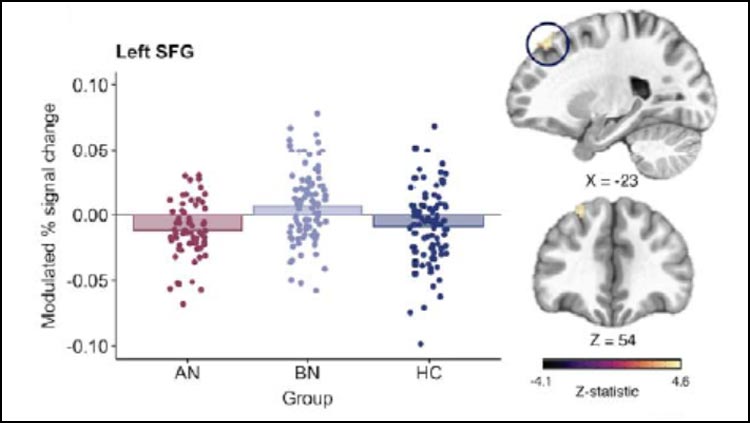 Stress changes brain activity in regions related to self-inhibition but does not induce binge-eating.
Stress changes brain activity in regions related to self-inhibition but does not induce binge-eating.
Stress alters brain activity in inhibition network but doesn’t prompt binge-eating, contrary to theory.
Stress alters brain activity in self-inhibition areas yet doesn’t trigger binge-eating, according to new research published in JNeurosci.
People who binge-eat, a hallmark symptom of several eating disorders, can feel out of control and unable to stop, and often binge after stressful events. This led scientists to theorize stress impairs the brain regions responsible for inhibitory control — the ability to stop what you are about to do or currently doing — and triggers binge-eating.
 Impaired proactive inhibition in bulimia nervosa is associated with increased superior frontal gyrus activity. Credit: Westwater et al., JNeurosci 2021
Impaired proactive inhibition in bulimia nervosa is associated with increased superior frontal gyrus activity. Credit: Westwater et al., JNeurosci 2021
Westwater et al. tested this theory by using fMRI to measure the brain activity of women with anorexia, bulimia, or without an eating disorder as they completed an inhibitory control task, either while stressed or relaxed. The task entailed pushing a button to stop a moving bar when it reached a specific point on the screen. On some trials the bar stopped early, and the participants had to prevent themselves from pushing the button. Stress altered the brain activity associated with inhibitory control in both groups of women with eating disorders but had no effect on task performance — meaning they still had the ability to stop their actions. These results indicate self-inhibition is preserved in the face of stress, so the actual mechanism behind binge-eating is more complex than previously thought.
For more on this research, read Contrary to Theory, Stress Does Not Lead to Loss of Self-Control in Eating Disorders.
Reference: “Prefrontal responses during proactive and reactive inhibition are differentially impacted by stress in anorexia and bulimia nervosa” by Margaret L. Westwater [MPhil], Flavia Mancini [PhD], Adam X. Gorka [PhD], Jane Shapleske [MD], Jaco Serfontein [MD], Christian Grillon [PhD], Monique Ernst [MD, PhD], Hisham Ziauddeen [MRCPsych, PhD] and Paul C. Fletcher [MRCPsych, PhD], 12 April 2021, Journal of Neuroscience.
DOI: 10.1523/JNEUROSCI.2853-20.2021

